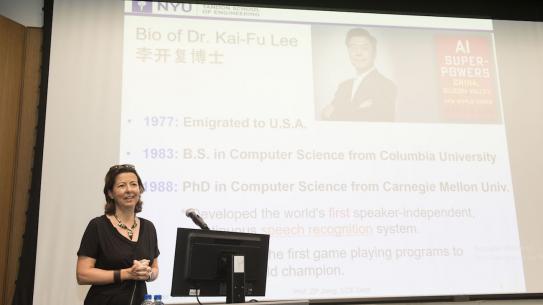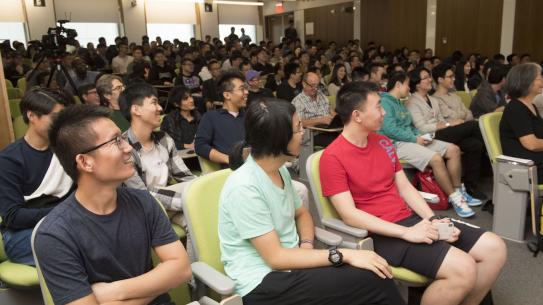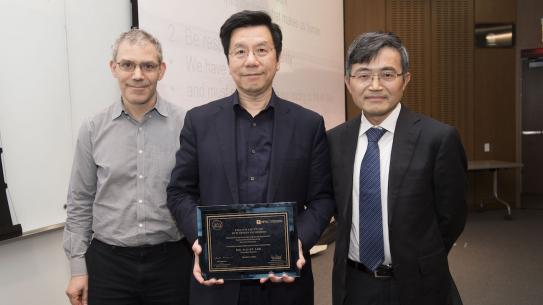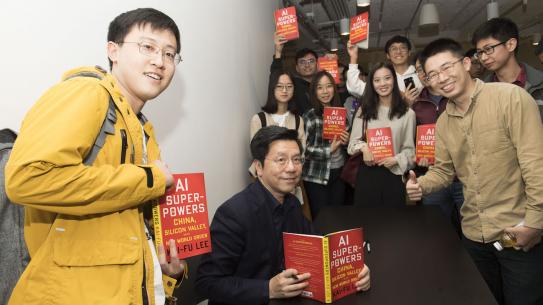Megawatt AI Expert Kai-Fu Lee Draws Standing-Room Crowd
First Dean’s Lecture under Tandon’s New Leader, Jelena Kovačević
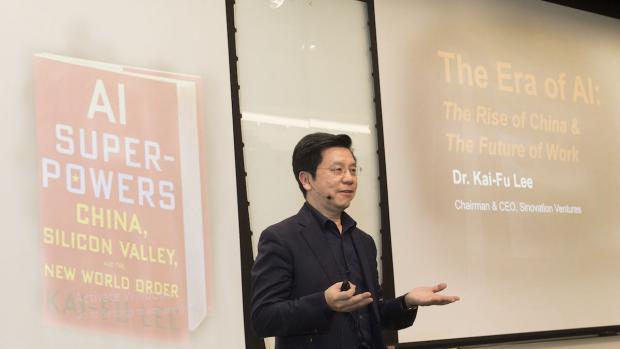
AI expert, Kai-Fu Lee, gave the inaugural Dean's Lecture to a packed house
Kai-Fu Lee – the Chairman and CEO of Sinovation Ventures, former President of Google China, and the author of the recent book AI Superpowers: China, Silicon Valley, and the New World Order — walked into a packed auditorium at the NYU Tandon School of Engineering and was greeted with a level of enthusiasm usually reserved for the likes of Jay-Z or Justin Bieber. The response was perhaps unsurprising given that Lee is widely considered something of a rock star in the world of Artificial Intelligence (AI). He is credited with the development of the world’s first continuous speech recognition system, a feat he accomplished as a doctoral candidate at Carnegie-Mellon, and his current company has incubated dozens of startups valued at more than a billion dollars each — “unicorns” in venture-capital parlance — many in the realm of AI.
Lee was visiting Tandon to present the October 9 Dean’s Lecture — the first given under the auspices of Jelena Kovačević, who this fall became the first female leader in school history. (In engineering circles she’s thus considered to be something of a rock star in her own right.) The standing-room-only event was hosted by the Department of Electrical and Computer Engineering and organized by Professor Zhong-Ping Jiang.
Introducing the themes of his book (copies of which he signed for excited students after his lecture) Lee explained that the U.S. and China were operating in what amounted to parallel universes, with vastly differing markets and rules.
“Silicon Valley was responsible for the initial technology breakthroughs in AI because they were research-driven,” he explained, “but China was application-driven and quick to leverage that tech in products and services that have generated unprecedented amounts of data. China is now to data what Saudi Arabia is to oil.”
Aside from sheer numbers (China has surpassed 800 million users this year compared to roughly 290 million in the U.S.), China enjoys an advantage in its relatively permissive techno-utilitarian policies. “There’s a saying there that translates to ‘let the bullet fly,’” Lee said. “If it hits somebody, then regulate it. So, for example, while there’s reluctance to allow for the testing of driverless trucks in the U.S., in China they’re building entirely new roads for that purpose.”
Lee also asserted that tough markets make for tough, hard-working entrepreneurs, and China (where it’s common for those in the tech sector to work from 9 a.m. to 9 p.m., six days a week) may have an edge there as well. That ethos is allowing Chinese companies to build applications so big and so disruptive that they are virtually impossible to copy. He pointed to Meituan, which started out in 2010 offering restaurant reviews and discounts, much like Yelp in the U.S. The company then launched a delivery service, hiring 600,000 workers to transport food — for a nominal charge and in under 30 minutes — on electric mopeds, completely changing the way people eat in China (and, in the process, going public with a $60 billion valuation).
Despite speculation about which superpower will ultimately “win” the battle for AI supremacy, Lee sees AI not as a weapon but as a tool that can be used to make life better, solve societal problems, and free us for more enlightening and inspiring pursuits. “It’s not nuclear; it’s electricity,” he said.
He admits that AI technology poses challenges that will have to be solved, including issues of privacy, security, wealth inequality, data bias, and job displacement, but feels confident that humans are up to the task — although it may take someone with the imagination and creativity of a Steve Jobs to lead the way.
“Who knows,” he said. “The next Steve Jobs might even be sitting here in this room.”


